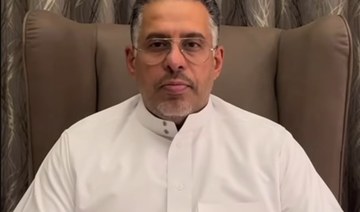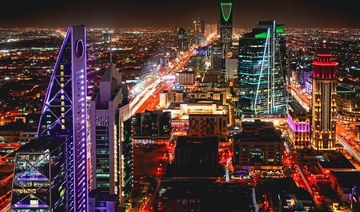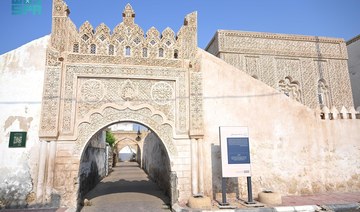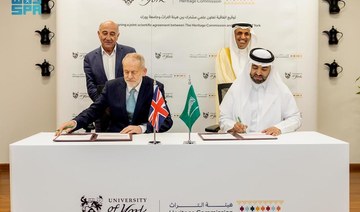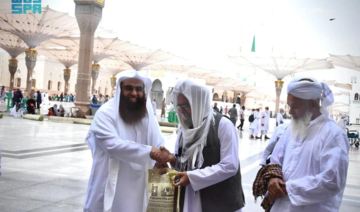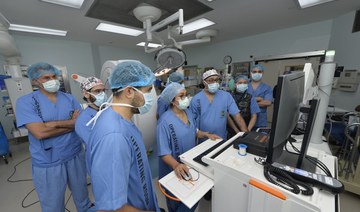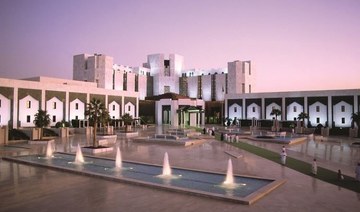RIYADH: Dr. Peter Feldhaus is the new CEO of the thyssenkrupp Industrial Solutions, which is currently building the largest cement plant in Saudi Arabia. Dr. Feldhaus has outstanding strategic skills in various sectors.
On the occasion of the German National Day, Dr. Feldhaus spoke with Arab News, on a range of subjects, mainly the growing presence of thyssenkrupp in Saudi Arabia in particular and in the Middle East and North Africa (MENA) region in general. He also focused on the Saudization of the workforce, thyssenkrupp’s plans to support the country’s Vision 2030 and the thyssenkrupp’s internal transformation program called “planets,” which is designed to make this giant German company more efficient, innovative and far ahead of its peers in the world.
Underlining the significance of German ties with Saudi Arabia, Dr. Feldhaus said: “The Kingdom is specifically a key growth country for us, and hence my current visit is to acquaint myself with the Saudi business environment, talk to customers and also to government officials.”
On the SR4.2 billion ($1.12 billion) Yamama Cement Project, he said it is the largest cement plant ever to be built here. “We are making very good progress on the implementation of the project. Yamama Saudi Cement Company has appointed thyssenkrupp to build two turnkey cement production lines with a total capacity of 20 000 tpd. The plants are being built at a new site about 80 km east of Riyadh,” he said.
“Our partnership with Yamama is built on a longstanding tradition and dates back many decades… We are delighted that Yamama is once again putting its faith in our comprehensive experience in the turnkey construction of complete cement plants worldwide. With our reliable, highly efficient technologies, we are profiting from infrastructure expansion in many growth regions and at the same time contributing to the conservation of valuable resources. thyssenkrupp Industrial Solutions is carrying out the contract on an EPC (Engineering, Procurement, Construction) basis. Its scope of supply includes all components for the new lines, from raw material preparation to clinker manufacture to cement loading. The main components include two mobile primary crushers for limestone, three crushers for additives, two crushers for correctives, as well as two circular blending beds for limestone, and various additive storage facilities. The new lines are scheduled to start operation in 2018,” he said.
Vision 2030
On plans to visualize cooperation within the framework of the Saudi Vision 2030, Feldhaus said: “The Vision 2030 is an interesting and fascinating set of framework. thyssenkrupp Industrial Solutions can play a major role in it. We are much broader in terms of our product spectrum. Saudi Arabia has put more focus on mining, which is also an important specific part of the Vision 2030. Our experience in mining is unmatched and unparalleled. As one of the few full-line suppliers worldwide, we are reliable partners to demanding customers, offering them tailored, cost-efficient and responsible solutions for mining, processing, handling raw materials.
“Our services include designing and building individual machines and complete installations as well as modernizing and upgrading existing systems. From low-cost standard machines to custom systems for extreme conditions — our solutions satisfy all requirements and create lasting value for our customers. To optimize our mining solutions, we use the high-precision, extremely robust radar technology, e.g. for positioning or for volumetric scans.”
Giving a detailed report of the mega projects currently being executed by his company in the MENA region and in the extended neighborhood including GCC countries, the thyssenkrupp Industrial Solutions CEO said: “We have had several projects in the region. We have supplied mining equipment to the Ma’aden.”
The company, he said, has completed the Safwa project in Eastern Province of the Kingdom. In Egypt, thyssenkrupp Industrial Solutions will be building a nitric acid plant as well as an ammonium nitrate plant for Abu Qir Fertilizers. The project will start by the beginning of next year, and the contracts will be concluded soon.
In fact, MENA is a very diverse region and offers many opportunities for thyssenkrupp. It covers 70 countries with different cultures, political and economic maturity. Young populations and dynamic societies create the need for industrial products and services that offer sustainable solutions. This is where thyssenkrupp as a diversified industrial company comes in. “In the region we are particularly strong in Elevator Technology and Industrial Solutions businesses, but present also with Components Technology & Materials Services. In the 2015/16 fiscal year, sales in the region amounted to around €2.4 billion. That’s something our approximately 4,300 Thyssenkrupp employees in the region can be proud of. Our regional headquarters are in Istanbul, Turkey.”
Feldhaus thinks his new technology and services are designed to drive efficiency and competitiveness especially in downstream industry in the Middle East region.
Giving a broad view of it, he said thyssenkrupp Industrial Solutions has a line of new technologies and services, which are designed to drive efficiency and competitiveness in the downstream industry in the Middle East. Most of the operation and maintenance programs for the existing plants until now are focused on supervising and executing linear updates and technological exchanges. However, asset management has to go even further and be integrated into the plants’ management and engineering processes, to be able to boost a plant’s efficiency. Combined, engineering competence, plant building experience and integrated asset management help unlock unutilized capabilities and improve the overall performance and efficiency to achieve higher performance and profit margins. “We have been in this region for more than 150 years. We are developing solutions that enable the energy and industrial sectors to operate at their full potential. We are heavily investing in our electro chemical technologies, which will help energy storage,” he said.
“We are in general working on optimizing the energy efficiency and ecology of our plants and technologies. For example for our cement plants, where we are reducing the energy consumption and greenhouse gas emissions.”
On reorganizing the company as part of the transformation program “planets,” Feldhaus explained the changes after reorganization and culture change within the business area, saying “With planets we strategically transform our business area Industrial Solutions. We are setting Industrial Solutions up for future success.” The aim, he said, is to secure growth by increasing competitiveness, focusing more strongly on customers and markets — including a strengthened regional footprint — as well as on expanding our service business. One key element of this is driving cultural change within the business area.
On working for the nationalization (Saudization) of workforce in his Saudi operations and the initiatives that thyssenkrupp has taken to train and employ young Saudis, the CEO said: “We are generally increasing our local capabilities in the Kingdom of Saudi Arabia.”
To achieve this, the company supports the Saudi Arabian engineers program, as part of which Saudis study at German universities, he said.
“Until today, we have already trained 15 of those highly qualified engineers on the job at our technology centers in Germany after their studies. All of them are now working for thyssenkrupp in Riyadh. We encourage and welcome Saudi graduates to apply at our company as we are looking to hire more Saudis in the months and years to come.”
We are increasing our local capabilities in Kingdom to help Saudization
We are increasing our local capabilities in Kingdom to help Saudization
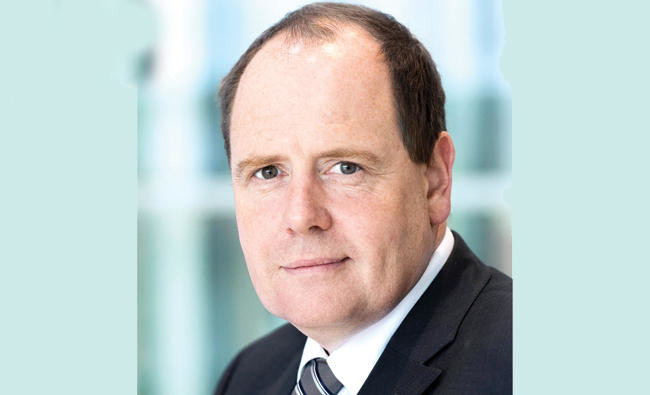
Saudi forces participate in Eager Lion military drill in Jordan

RIYADH: Units from the Saudi Armed Forces are participating in the Eager Lion military drill, held in Jordan from May 12-23, with the involvement of the armies of 31 countries, the Saudi Press Agency reported.
The head of the Saudi Armed Forces Education and Training Authority, Maj. Gen. Adel Al-Balawi, explained that the exercise aims to exchange expertise and train on planning and implementing joint operations and missile air defense operations, as well as implementing counter-terrorism and maritime security operations to confront regional threats.
The Armed Forces, represented by the General Staff, the Joint Forces Command, and the land, air, sea, and air defense branches, are participating in the exercise.
Recently, the Royal Saudi Air Force concluded its participation in the mixed air exercise Desert Flag, conducted at Al-Dhafra Air Base in the UAE, alongside forces from several friendly countries.
The commander of the forces involved, Lt. Col. Adel bin Saeed Abu Malhah, said that the exercise, which lasted for three weeks, included the implementation of offensive and defensive air counter-operations and support for surface forces within new and complex scenarios under various threats.
He noted that the RSAF participated with six fighter jets from the F-15SA system with full air, technical, and support crews, conducting 80 daytime and night sorties and aerial refueling.
Botulism outbreak traced to mayonnaise at Riyadh restaurant
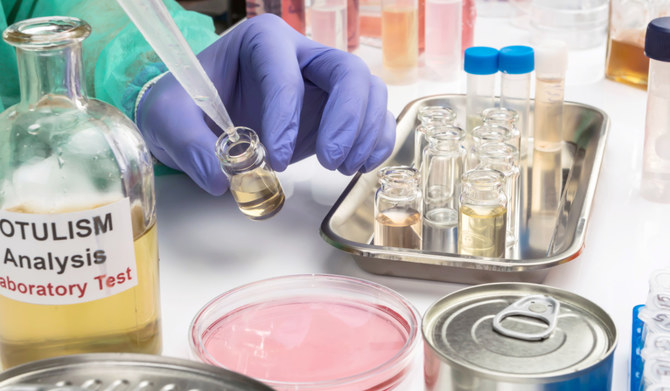
- Saudi food authority discovers clostridium botulinum in Bon Tum brand product; ministry implements strict measures
RIYADH: The Ministry of Municipal, Rural Affairs and Housing announced on Saturday that a Saudi Food and Drug Authority laboratory test had found clostridium botulinum in a Bon Tum mayonnaise brand used by the Hamburgini food chain.
Since the bacterium was discovered in a Bon Tum factory, the ministry has collaborated with the SFDA and other authorities to enforce additional measures beyond those previously implemented.
These measures include suspending the distribution of the mayonnaise product and withdrawing it from markets and food facilities across all cities in the Kingdom. They also include halting operations at the factory in preparation for implementing statutory procedures.

Any remaining quantities of the product at the factory across all batches and expiration dates have also been withdrawn, and all factory clients, including restaurants and food establishments, have been notified to dispose of any quantities they own.
The ministry has also issued instructions to continue the monitoring, investigation, and inspection campaigns across all cities of the Kingdom by municipalities and relevant authorities, ensuring the safety of food products provided to consumers.
Authorities have emphasized the importance of obtaining information from official sources and not being swayed by rumors and misinformation.
HIGHLIGHTS
• The botulism outbreak was first brought to light on April 27 when Riyadh municipality received a report of food poisoning cases linked to the Hamburgini restaurant chain.
• New measures undertaken by authorities include suspending the distribution of the Bon Tum mayonnaise product and withdrawal from markets and food facilities in the Kingdom.
• Any remaining quantities of the product at the factory across all batches and expiration dates have also been withdrawn.
• Authorities have emphasized the importance of obtaining information from official sources and not being swayed by rumors and misinformation.
Dr. Nezar Bahabri, infectious diseases consultant at the International Medical Center in Jeddah and the director of the Saudi Society of Medical Microbiology and Infectious Diseases in Jeddah, told Arab News that contracting illness through clostridium botulinum is very rare as it thrives in non-oxygenated (anaerobic) environments and is typically found in improperly preserved foods.
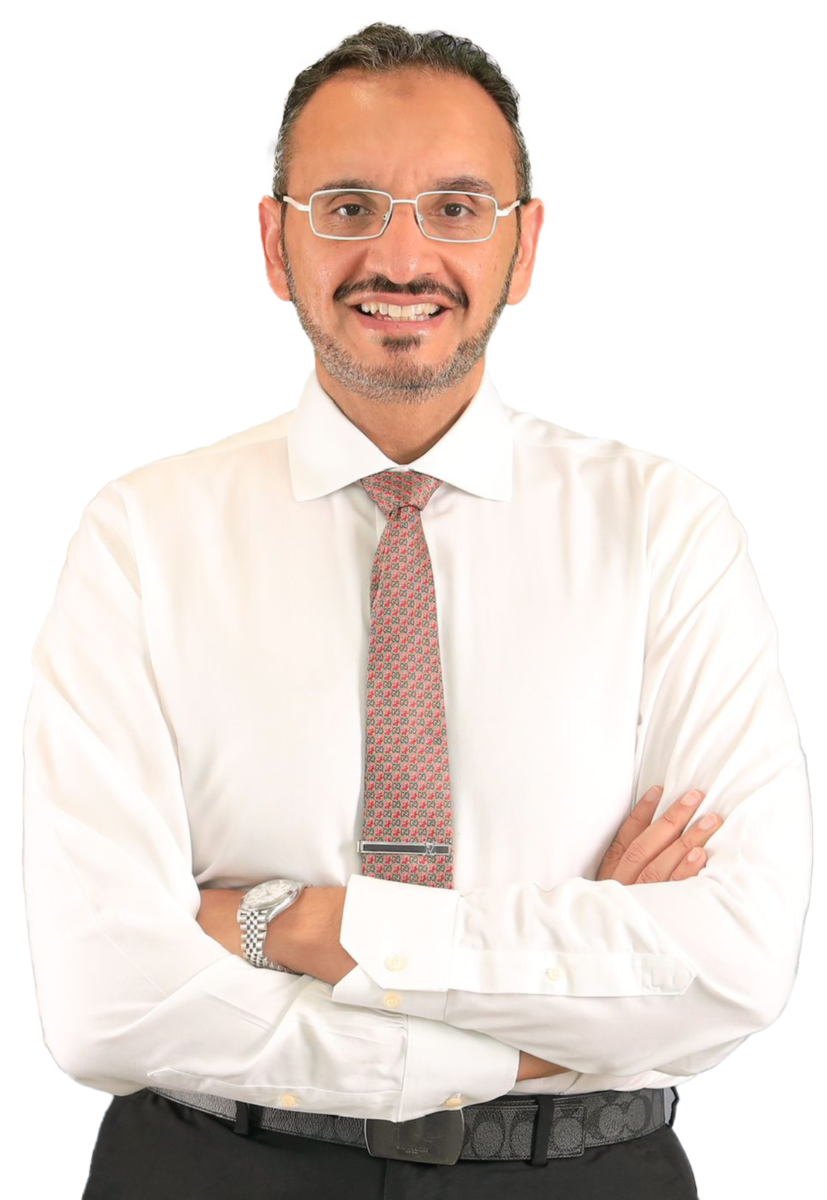
The bacterium produces a toxin that attacks the body’s nervous system, resulting in muscle weakness, blurred vision, difficulty speaking and swallowing, and eventually paralysis. Typically, the likelihood of exposure to this bacterium is low with modern food safety practices in place.
Bahabri said: “When this bacterium is ingested, and the toxin is released, symptoms will manifest within a few hours up to around two days.”
Mohammed Al-Awamy, a gastroenterologist, told Arab News: “Symptoms start in the face and then descend to involve the limbs and trunk. Respiratory failure ensues due to involvement of the respiratory system leading to cardiopulmonary collapse.”
The best measure to be taken is eating fresh and cooked food as the heat of cooking will kill the bacteria, and the toxin will become ineffective.
Dr. Nezar Bahabri, Infectious diseases consultant, International Medical Center
The symptoms of botulism, the illness caused by clostridium botulinum, are quite distinct and can be quickly recognized and treated with an antitoxin.
Bahabri explained: “If it was an injury, we will clean the wound and the infected tissue. If it is due to ingestion, we administer antitoxin, IV (intravenous) fluid, and painkillers as needed.”
Botulism is a life-threatening neurological disorder resulting in paralysis and death if not treated promptly.
Bahabri said that a patient must be admitted to hospital for observation, adding: “If the patient develops symptoms or weakness in the respiratory or lung muscles, we will transfer them to the ICU (intensive care unit) to put them in mechanical ventilation until the antitoxin works.”
Bahabri said that with proper treatment, the chance of a patient dying was less than 7 percent, adding: “The best measure to be taken is eating fresh and cooked food as the heat of cooking will kill the bacteria, and the toxin will become ineffective.”
The occurrence of clostridium botulinum infections is extremely uncommon due to the precautions taken in food preparation and handling. Therefore, it is important to stay informed about food safety guidelines and to be cautious when consuming canned or preserved foods.
The botulism outbreak was first brought to light on April 27 when Riyadh Municipality received a report of food poisoning cases linked to the Hamburgini restaurant chain.
The Ministry of Health said 75 people were affected in the outbreak, which included one death, and that no new cases had been recorded.
Dr. Mohammed Al-Abd Al-Aly, the Kingdom’s Health Ministry spokesperson, said on social media platform X: “The total number of recorded cases stands at 75, including 69 Saudi nationals and six non-Saudis.”
He also confirmed at the time that the only source of the contaminated food was from the local Hamburgini fast-food restaurant chain.
In response, health oversight teams promptly initiated an investigation and began monitoring the situation. By 10 p.m. on Thursday, all locations, branches, and the main catering factory of the restaurant chain in Riyadh were ordered to close.
Delivery services through the facility or via applications were suspended, and coordination efforts were initiated with key bodies, including the Ministry of Health, the Food and Drug Authority, and the Public Health Authority.
People reacted on social media platforms after the announcement of the lab results.
McDonald’s Saudi Arabia wrote on X: “We, at McDonald’s Saudi Arabia, assure everyone that we do not use, nor have we ever used, Bon Tum mayonnaise … No case of poisoning was detected in any of our restaurants, thank God, and none of our branches were closed during this entire period.
“We wish and pray for all those injured to recover quickly. May God protect our country and our honorable people from all harm.”
@MohammedLegandry wrote on X: “This mayonnaise is officially the cause of the poisoning cases that occurred. I think it is positive news for the sector as long as the problem is identified, and it limits the messages of weak-minded people, the writing and spreading of circulating rumors, frightening people, and causing panic.”
“We are reassured that government agencies are keen on the public health of individuals,” posted @Nnalshriii.
@Abusayel54 commented on X: “I hope that the factory will be defamed, closed, and fined.”
@iiuxr8 said: “Is the mayonnaise the main cause of poisoning, or poor storage? (by Hamburgini).”
Another user @Hamoooo11 wrote: “Food quality and safety is the role of the restaurant itself to ensure its products, even if they are sourced externally. Otherwise, what is the point of a specialist and quality controller in their facilities?”
Pearls of Farasan offer a deep dive into the past
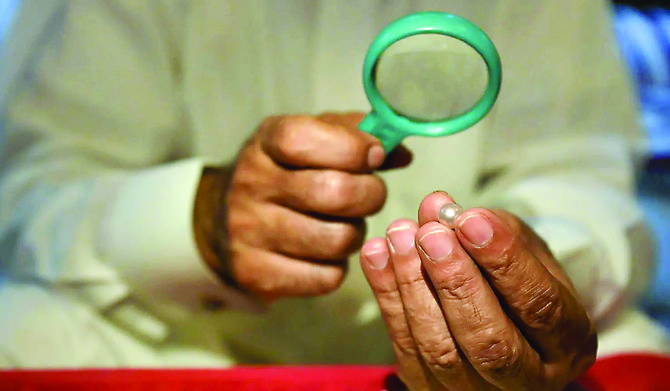
- The lucrative pearl trade in the past centuries contributed to the formation of a wealthy class in Farasan, whose trade led them to market pearls abroad
- Little was known that the search for pearls were associated with hardship, fatigue, and risk for fishermen who spent long months diving, away from home
RIYADH: Farasan Islands’ Hareed festival, which concluded recently, marked the start of annual pearl fishing trips, an ancient skill and a major source of the islanders’ prosperity.
Ships once carried 30 to 40 islanders in search of pearls, a lucrative source of income in previous centuries.

Sheikh of the Farasan Islands, Mohammed bin Hadi Al-Rajhi, described the stages of preparation for pearl fishing trips, which began with the shipowner inspecting and preparing his vessel, and providing sailors’ homes with supplies and foodstuffs that will suffice their families for the duration of their absence at sea.
He also prepared food for the trip, including red corn or whole wheat, and drinking water stored in clay vessels.
FASTFACTS
• A pearl merchant, Suleiman Balaous, classified pearls according to size and weight.
• One variety, ‘Al-Dana,’ meaning round, is distinguished by its large weight, bright luster, and absence of flaws.
• Smaller varieties such as ‘Al-Mazouri,’ ‘Al-Ansar,’ and ‘Al- Badla,’ have irregular shapes.
Al-Rajhi, an expert on pearl fishing, added: “The beginning of the month of May witnessed the start of these trips that last for three or four months, which are the summer months when it is easy to obtain pearls, so the fishermen set sail to Al-Maaden (mineral) areas, which abound with oysters containing pearls.”

Once the deep dives begin, diving activities were divided over five days, with the first four days’ harvest going to the divers and the fifth day’s harvest going to the shipowner, he said.
Divers used a weight tied to one foot to help them descend to depths of 12 meters and more to extract pearls. The diver communicated with an assistant on the deck of the ship using a rope, which was also used to pull him back to the surface.
In return for this assistance, the diver allocated a portion of his harvest — known as “dangeel,” a net in which the oysters were collected — to the assistant as payment.

Diving would start following the fajr prayer, with work continuing until noon. Afterward, the crew would rest before beginning the “fulq” process, which involved opening the oysters, allowing each diver to inspect their daily harvest.
Referring to pearl sorting tools owned by pearl merchants at that time, Al-Rajhi said that merchants had copper sieves of various sizes, to sort large pearls from small varieties.
A pearl merchant, Suleiman Balaous, classified pearls according to size and weight. One variety, “Al-Dana,” meaning round, is distinguished by its large weight, bright luster, and absence of flaws.
Smaller varieties such as “Al-Mazouri,” “Al-Ansar,” and “Al-Badla,” have irregular shapes, while pearls harvested from the Farasan Islands are distinct from those in most pearl diving areas in terms of color and clarity, Al-Rajhi said.
The long months of pearl diving were associated with hardship, fatigue, and risk, and fishermen invented the folk songs of Al-Dana for entertainment. It has emerged as one of the oldest folk arts in Farasan, expressing the sailors’ longing during long absences searching for pearls.
The lucrative pearl trade in former centuries contributed to the formation of a wealthy class whose trade led them to market pearls in Gulf Arab countries, Europe, and particularly in India, which was a major pearl market.
Traders saw Eastern arts and inscriptions on buildings, which influenced their cultural and architectural ideas. They introduced these motifs to the Farasan Islands, where they were reflected in several wealthy individuals’ homes, particularly the two houses of Al-Rifai, one of which belongs to Ahmed Al-Munawar Al-Rifai and was completed in 1922, and the other belongs to Hussein bin Yahya Al-Rifai.
This also influenced the construction of the Najdi Mosque, which was completed in 1928 by Sheikh Ibrahim Al-Tamimi, popularly known as “Al-Najdi,” who worked in the pearl trade and was impressed by Eastern civilization due to his numerous travels to India.
Pearls played a major role in Farasan’s commercial and economic activity until the trade faded with the rise of agricultural and industrial pearls, becoming part of the islands’ heritage and ancient culture.
General Directorate of Public Security warns citizens about fake Hajj advertisements on social media
General Directorate of Public Security warns citizens about fake Hajj advertisements on social media

- Severe penalties to be imposed for engaging in such activities
RIYADH: Citizens in Saudi Arabia were warned on Saturday by the General Directorate of Public Security to disregard fraudulent advertisements on social media.
The authorities highlighted adverts that falsely claim to facilitate various aspects of Hajj, including performing Hajj on behalf of others, securing and distributing Adahi (sacrifices), selling Hajj bracelets, and providing transportation, the Saudi Press Agency reported.
The directorate emphasized that severe penalties would be imposed on individuals apprehended for engaging in such activities.
It also said that the Project for Utilization of Hady and Adahi is the only official platform authorized to sell and promote Adahi bonds.
Public Security also urged citizens and residents to strictly adhere to Hajj regulations and guidelines.
It said any violations should be promptly reported by calling 911 in Makkah, Riyadh, and the Eastern Region, or 999 in the rest of the regions of the Kingdom.
Saudi Arabia’s KFSH&RC chief hails hospital’s transformation in speech at Harvard
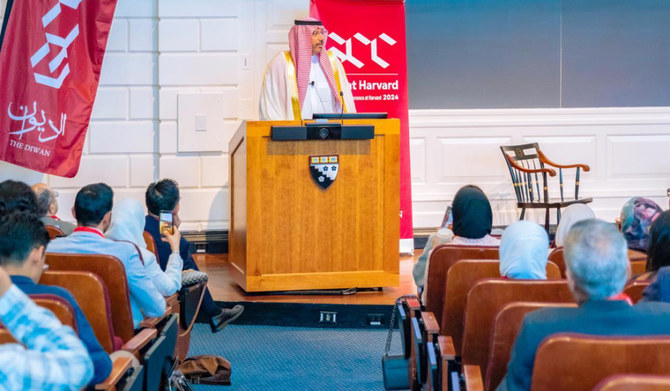
- The facility has recorded significant breakthroughs in the research of T-cell therapy, robotic surgery, organ transplantation and personalized medicine
RIYADH: King Faisal Specialist Hospital and Research Center is providing leading healthcare in the region after undergoing a decades-long transformation plan, its CEO has said.
Dr. Majid Ibrahim Al-Fayyadh was speaking at Harvard University’s Gulf Creatives Conference in the US.
He highlighted the role of the hospital in providing cutting-edge care in Riyadh, reducing the need for patients in the region to make long journeys for treatment.

The hospital uses advanced methods to treat heart disease, cancer and genetic diseases for patients in the Kingdom and wider Middle East, the Saudi Press Agency reported on Saturday.
The conference at Harvard, organized by The Diwan, a student-run organization at the university in Cambridge, Massachusetts, is being held from May 10-12.
HIGHLIGHT
At the conference, the KFSH&RC chief also took part in a panel discussion on the future of the health sector and the hospital’s transformation in patient care. Al-Fayyadh highlighted the impact of hospital innovation in the Kingdom in supporting the objectives of the Health Sector Transformation Program and Saudi Arabia’s Vision 2030.
Al-Fayyadh highlighted the transformation of KFSH&RC, which aligns with its strategic vision to lead healthcare innovation globally through excellence and investment in advanced technology.
“The Saudi leadership has a clear vision for KFSH&RC, which was crowned by royal order to transform it into an independent institution of a private, nonprofit nature,” he said.
The transformation includes enhancing existing services and exploring new medical trends to improve health and well-being, he added.
Al-Fayyadh highlighted the hospital’s efforts to pioneer efficiency in healthcare spending and adhere to evidence-based practices for optimal patient outcomes. By adopting initiatives that broaden access to quality treatment worldwide, the hospital continues to play a leading role in healthcare innovation, he said.
The facility has recorded significant breakthroughs in the research of T-cell therapy, robotic surgery, organ transplantation and personalized medicine. It seeks to improve its international competitiveness by investing in advanced medical facilities, developing diagnostic and therapeutic techniques, and enhancing human resources services, Al-Fayyadh added.
At the conference, the KFSH&RC chief also took part in a panel discussion on the future of the health sector and the hospital’s transformation in patient care.
Al-Fayyadh highlighted the impact of hospital innovation in the Kingdom in supporting the objectives of the Health Sector Transformation Program and Saudi Arabia’s Vision 2030.




